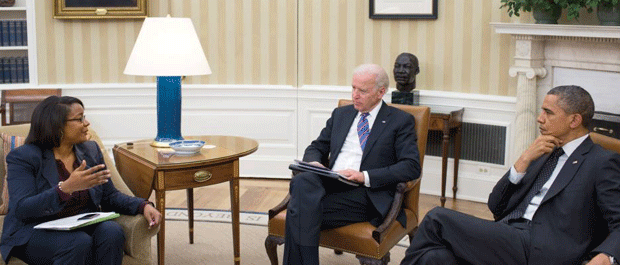As the former cabinet secretary, senior adviser, and associate counsel to President Barack Obama, Gray spent more than five years inside the White House—advising the president and working on policies such as the Affordable Care Act. Prior to her tenure in the White House, Gray was the deputy director of the National Economic Council and worked as a law clerk for U.S. Supreme Court Justice Stephen Breyer. Gray currently is a partner at O’Melveny & Myers LLP in New York, where she specializes in policy, regulatory issues, health care, and governmental issues.
During your tenure in the White House, Newsweek called you “the most powerful staffer you’ve never heard of.” You were known as an honest diplomat who was able to build trust between Obama and his cabinet. How did you develop your diplomacy skills?
By the time I was cabinet secretary, I had worked for President Obama and with many of the individuals who were ultimately in the cabinet for the better part of six years. When I began working at the White House, I split my time between working on judicial nominations and working on policy issues. A lot of the role I played really called for me to act as an honest broker of often different and competing views. One of the jobs when you are the deputy director of the National Economic Council is to convene a lot of views so that you can determine what the best position is and present those options to the president. I think I was able to build those relationships and the trust that comes with it.
Do you have a favorite memory from your time in the White House?
The night the Affordable Care Act passed. I don’t think in all my years working in government and for President Obama, anything will top that. The president invited all of the staff in the White House and the agencies that worked on the bill to the Truman balcony of the White House to celebrate its passage. I have a photo in my office of that night, and it’s one of my most treasured photos.
At Duke you were a “Reggie,” a recipient of the prestigious meritbased Reginaldo Howard Memorial scholarship— named in honor of Duke’s first African-American student-government president. How did being a Reggie impact your time at Duke?
When I think back to my first experiences with thinking about how to change a system and how to work within a bureaucracy to effect change, I really think about my experience as a Reggie. I was the president of the scholarship organization during my time at Duke and got to work with President Nan Keohane on solutions for getting more funds for the program. That experience taught me leadership. I remember thinking I really could do anything.
How did your Duke experience prepare you for your journey into law and politics?
I was always interested in thinking about how people effect change. I remember taking classes on economic inequality. I remember taking seminars on constitutional law and thinking about the role of lawyers in pursuing social change. I took an economics class with Lori Leachman. The class was on how economic policy can improve social conditions for people. I think my coursework, for sure, stimulated an interest in thinking about public service.
What is your advice to Duke students and alumni who would like to pursue the intersection of law and politics?
Take calculated risks. I think careers now don’t always work out neatly anymore. Sometimes something might just fall in your lap. Be open to risk-taking when you have that very solid fallback of your Duke education. Also, if you’re in the private sector, you need to think about ways you can continue to serve the community or to demonstrate expertise in public policy. Keep a foot in the other world.
What does it mean to you to be “Forever Duke?”
What “Forever Duke” means to me is that I’m forever grateful. In many ways I feel indebted to Duke for the opportunities it has provided me. My closest and best friends I met at Duke. The first inkling I had that I would want to pursue a life in public service was born at Duke. Some of my happiest memories are related to Duke—many of them involve basketball. I believe that I owe it to the institution to pay it back, which is why I’m interested in helping students on campus and supporting financial-aid opportunities for lower-income students so that more students from backgrounds like the one I had can attend Duke and take advantage of it.


Share your comments
Have an account?
Sign in to commentNo Account?
Email the editor